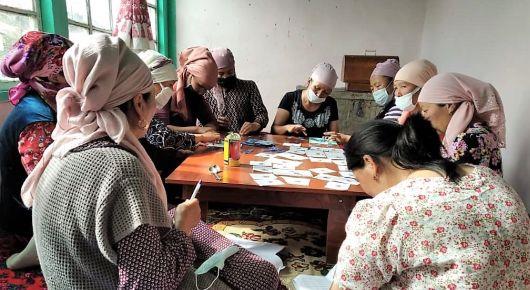Rural families receive joint FAO-WFP support to combat climate change and COVID-19

Climate change is one of the biggest global challenge of our times. Thousands of rural farmers and families are already suffering from consequences that may continue to enlarge, increasing the risk of poverty, food insecurity, and forced migration.
Some parts of Kyrgyzstan were hit hard by flood, frost, and snowfall in April – an additional layer of hardship on vulnerable rural families affected by labour migration, who have already been cut off from employment due to COVID-19 border closures and movement limitations. These circumstances have left more than a thousand families without access to food markets and adequate knowledge on essential agricultural techniques and practices, which would have helped them to grow food in their backyards.
To stand by the people in need, FAO and WFP have joined their efforts to deliver emergency assistance to families in Kyrgyzstan’s five western, south-western districts (Suzak, Nookat, Ak-Talaa, Batken, and Leylek).
With support from the Agency for Development Initiatives (ADI), FAO and WFP will contribute to strengthening the resilience of selected local farmers and vulnerable families against climate shocks through providing agricultural trainings and input, flour, and vegetable oil.
“Crises that we are facing today wait for no one. Especially, when we are talking about climate change impact during the pandemic and vice versa,” said Dinara Rakhmanova, Assistant FAO Representative in Kyrgyzstan. “Our technical and timely assistance will contribute to improve food security, reduce poverty, and achieve sustainable development in the region.”
The joint Multidisciplinary Fund Climate Action Initiative covers 40 villages and combines the FAO’s expertise in agriculture together with WFP’s “Food Assistance for Assets” approach. The seeds of local and hybrid varieties were donated from ADI through their local network, Dyikan Muras.
“Our conditions became more complication when the weather started to change,” said Zhoroeva Gulsunay, a village mobilizer from Ming Zhygach village. “Because of the April frosts, mudslides, and floods, we could not grow even that small amount of seeds that we had.”
For the convenience and systematization of the training process, a small electronic database of video tutorials on agricultural technologies will be created for the local agriculture specialists. Also, FAO will assist in promoting rural farm produce among residents of major cities through a community-based agriculture website.
The activity is part of FAO’s wider Multidisciplinary Fund Climate Action Initiative that aims to strengthen collaboration across disciplines and organizations for higher efficiency and impact in FAO’s work, as well as of the regional initiative managing natural resources sustainably, under a changing climate.
2 June 2020, Bishkek, Kyrgyzstan
